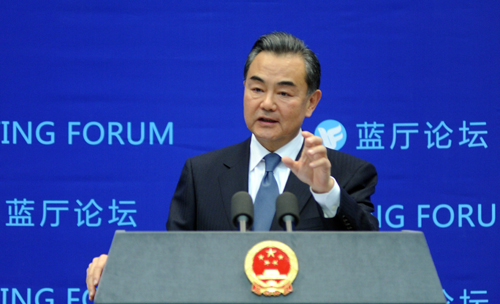Japan to be 'respected guests' at APEC
 0 Comment(s)
0 Comment(s) Print
Print E-mail China Daily, October 30, 2014
E-mail China Daily, October 30, 2014
|
|
|
Chinese Foreign Minister Wang Yi delivers a speech on the upcoming APEC Beijing Summit at the Lanting Forum in Beijing on Oct. 29, 2014. [Photo: fmprc.gov.cn] |
Foreign Minister Wang Yi said on Wednesday that China will extend a hospitable welcome to all visiting APEC leaders amid ongoing global media speculation concerning whether the leaders of China and Japan will meet one-on-one at the event next month.
Japanese Prime Minister Shinzo Abe will attend the November meeting in Beijing, and Tokyo has frequently stated its desire for an official dialogue to take place between President Xi Jinping and Abe.
Xi met on Wednesday with former Japanese prime minister Yasuo Fukuda, viewed by Japanese media as a possible intermediary. Fukuda, also chairman of the board of directors for the Boao Forum for Asia, is part of a visiting delegation.
An official release by Xinhua News Agency did not mention whether their talks included Sino-Japanese relations, but did say that Fukuda invited the president to attend the Boao Forum's annual meeting next year, an invitation that Xi accepted.
At a Foreign Ministry briefing on Wednesday about the agenda of the APEC event, Wang did not directly describe the format that will be used when the two leaders greet each other at APEC or meet on its fringes.
"China is the host state, and as Chinese custom goes, all visitors will be treated as respected guests. We will exercise necessary hospitality toward all the guests," Wang told reporters.
The top diplomat mentioned "the problems and obstacles that cloud the regular development of the China-Japan relationship", adding that "they are facts and should not be avoided".
"I hope that the Japanese leader and the Japanese can face up to the existence of the problems and be sincere in resolving the issues," Wang said.
Officials and observers from both countries have debated for months about the necessity of an official meeting.
Abe and his Cabinet have angered Beijing by actions and uttering remarks that have been widely interpreted as provocative regarding both historical and territorial issues.
Ruan Zongze, vice-president of the China Institute of International Studies, said a leaders' summit is "unlikely so far", and one of Tokyo's top priorities should be "to exercise restraint rather than delivering more inflammatory remarks or actions".
Abe's visit to the controversial Yasukuni war shrine in Tokyo in December saw a deep chill settle over relations.
Earlier this month, Japanese Chief Cabinet Secretary Yoshihide Suga said no evidence can be found to prove that "comfort women" - a euphemism for Asian women forced into sexual slavery by Japan's imperial army-were "forcibly recruited".
Zhang Yunling, a senior researcher of Asia-Pacific studies at the Chinese Academy of Social Sciences, estimated that any improvement in the relationship will "require a huge endeavor".
In his Wednesday speech about APEC, Wang said "Beijing is ready" to host an event that will "herald breakthroughs" regarding regional integration, new economic driving forces and the enhancement of connectivity.
He confirmed that the event will reach a consensus in initiating the process of free-trade agreements for the Asia-Pacific region, which will be "a new step forward for boosting regional economic integration".
China is advocating further connectivity within the Asia-Pacific region, and a common front in boosting the fight against corruption, Wang noted.
As the Chinese economy sees the service sector play a greater role, its transformation will "greatly benefit regional economic cooperation", said Chi Fulin, president of the China Institute for Reform and Development in Hainan province.







Go to Forum >>0 Comment(s)